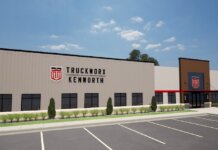
When Mazda Toyota Manufacturing (MTM) started production in Huntsville in September 2021, it was the culmination of three years of anticipation and planning. The joint venture by Mazda and Toyota, which exists only in Huntsville, was announced in 2018 and construction began in 2019. After pandemic-fueled delays, the plant now has two lines operating, with plans to ramp up staffing and production during 2022.
In addition to bringing thousands of new jobs and infrastructure to north Alabama, the new Mazda Toyota plant also brings a unique automotive partnership and the opportunity to build all-new vehicles.
Partnering for progress
In 2015, Mazda and Toyota entered into a partnership to share technologies and explore areas in which they could benefit each other. Within a couple of years, the two companies had made the decision to build a factory in the. U.S. and develop new electric vehicles and connected car and autonomous driving systems. When the Mazda-Toyota alliance chose Huntsville as the location for its new plant, it offered a long-term commitment to the state of Alabama.
“We want nothing more than to be a long-term part of the fabric of this community and build a vehicle that our neighbors are proud of here in Alabama, and that the customers trust and of course, love to drive,” says Mark Brazeal, MTM’s vice president of administration.
True to the spirit of partnership inherent in the plant’s existence, MTM features unique production processes that are the result of collaboration between Mazda and Toyota.
“Engineers from both companies collaborated together to develop new, innovative production line designs to improve efficiency and build quality into the vehicles we produce,” Brazeal says. “As a result, the design of MTM’s production lines is different than the traditional lines at our parent companies.”
Launching new products
One reason for the newly designed production lines is that MTM is producing vehicles that have never been produced at other factories. Its first line, the Apollo line, started production in September 2021 and is producing the new Toyota Corolla Cross, the first-ever Corolla crossover. The plant’s second line, the Discovery line, started production in January 2022 and is producing the new Mazda CX-50, a compact crossover SUV. Both production lines are named after famed NASA space programs, giving a nod to the Huntsville area’s role in those programs.
“We have been looking forward to the opportunity to build these vehicles since it was revealed that we would build all-new models for both Mazda and Toyota,” Brazeal says. “There is no doubt that MTM’s team members are dedicated to building quality and safety into every vehicle we produce. It is a one-of-a-kind experience to work at MTM: That means both one-of-a-kind challenges and one-of-a-kind opportunities.”
The plant has faced delays due to supply chain issues with raw materials such as steel and aluminum. However, “we have not yet experienced chip shortages for the all-new vehicles we are producing,” Brazeal says. “At this point, our parent companies Toyota and Mazda have both secured enough chips to support our production ramp up plan this year.”
With the start of production on the Corolla Cross in September and launching production on the CX-50 just four months later, “it has been an exciting, fast-paced time at MTM,” Brazeal says.

Planning for the future
To get production underway, MTM has hired 2,800 team members. The organization plans to continue hiring throughout 2022, aiming for an additional 1,200 employees this year, with plans to announce the start of its second shift later in 2022. At full production, MTM will employ up to 4,000 team members, Brazeal says.
As employment ramps up, production will follow. “Currently, MTM is still in a ramp-up period for our production lines, but once we’re in full production, MTM will produce up to 300,000 vehicles annually, split between the two lines,” Brazeal says. “This means that, at full production, our plant will produce a new vehicle every 83 seconds.”
At an event unveiling the new Corolla Cross in June 2021, Alabama Secretary of Commerce Greg Canfield called the Mazda Toyota plant a “capstone project” for the automotive sector in Alabama. Twenty-five years ago, Alabama didn’t produce any cars, and the state now ranks as the fifth largest vehicle-producing state in the United States. When Mazda Toyota reaches full operating capacity, Canfield expects Alabama to rank second or third.
Nancy Mann Jackson is a Madison-based freelance contributor to Business Alabama.
This article appeared in the March 2022 issue of Business Alabama.



